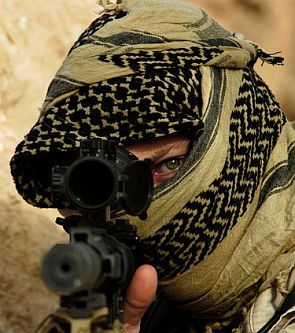 A madrasa teacher arrested from Odisha in connection with the busted Al Qaeda in Indian subcontinent module had allegedly sheltered two suspected Pakistan-based extremists who were later killed in an encounter in Lucknow, interrogators said.
A madrasa teacher arrested from Odisha in connection with the busted Al Qaeda in Indian subcontinent module had allegedly sheltered two suspected Pakistan-based extremists who were later killed in an encounter in Lucknow, interrogators said.
Investigators also found that the accused, Abdul Rahman, 37, was closely related to one of the persons held in connection with the 2007 GlasgowInternationalAirport attack, but failed to gather further leads in this line of inquiry.
"During his stay at Deoband in Uttar Pradesh, Rahman was introduced to two Pakistani nationals and he sheltered them in UP and in his hometown of Cuttack.
"In 2001, the two Pakistani nationals (names not disclosed) were killed in Lucknow in an encounter following which Rahman also went underground," said an official privy to the investigation.
Rahman was arrested on Wednesday by a team of the Delhi police's special cell from Jagatpur in Odisha's Cuttack district. He was living there with his family and taught at a madrasa.
"Rahman also has close ties with one of the persons arrested in connection with the Glasgow attack and had rendered financial help for his sister's marriage.
"However, it has so far turned out to be an entirely personal affair and there are no further leads in this regard," the official said. It is also clear by now that Rahman had known Mohd Asif for the past few years and they exchanged messages in different media.
Asif -- the first person to be arrested in connection with the module -- has now turned out to be the mutual link between Rahman and Umar Hyderabadi.
Hyderabadi was allegedly recruited by Rahman and is presently undergoing training at north Waziristan in Pakistan, said the official.
Hyderabadi, whose real name is not none, belongs to Hyderabad and came in touch with Rahman when he went there and allegedly delivered a heated speech. Rahman is believed to have delivered similar speeches in Odisha, Jharkhand and Karnataka too, the official said.
However, the police has not yet been able to find any connection between Rahman and Sambhal resident Zafar Masood, whose arrest on December 16 night was the third in the AQIS module case.
During the investigation, it emerged that Rahman's brother, Tahir Ali, who was arrested in 2002 in connection with the terrorist attack on the AmericanCulturalCenter in Kolkata, had taken shelter at his residence before his arrest.
However, these details need to be cross-checked with records of police department in Kolkata, the official said. Rahman and his recruit, Hyderabadi, have so far emerged to be the only non-Sambhal elements involved in the AQIS module.
On Monday, the Delhi police received a tip-off from intelligence units and arrested Mohammad Asif from northeast Delhi's Seelampur area, followed by the arrests of Rahman in Odisha and Masood from mohalla Deepa Sarai in UP's Sambhal district.
While Asif is believed to be AQIS's India head for motivation, recruitment and training, anointed by AQIS chief (Amir) Maulana Asim Umar alias Sanaul Haq, who is also a resident of Sambhal, Rahman is an alleged recruiter. Masood had acted as a financier for the module, the police said.
The accused have been booked under provisions of Unlawful Activities (Prevention) Act.
Masood, himself a former alleged Harkat-ul-Mujahideen operative, had allegedly given $500 in two instalments to Asif and his nephew Serjil, with which they -- along with
another youth, Rehan, from northeast Delhi's Welcome area -- went to a training camp in Pakistan via Tehran in Iran and Afghanistan, police said.






 © 2025
© 2025